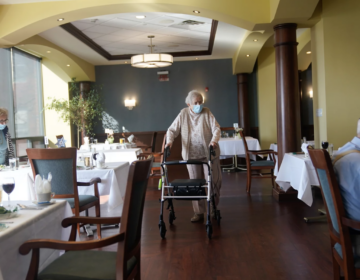Delaware Valley nursing home operators decry workforce shortage as they face new federal staffing rules
The Biden administration’s new federal staffing rules for nursing homes, celebrated by aging advocates and labor unions, will take effect in 2026.
Listen 1:15
FILE - Melvin Goldstein, 90, smiles as his daughter Barbara Goldstein gives him a kiss on the head during a visit to the Hebrew Home at Riverdale, Sunday, March 28, 2021, in the Bronx borough of New York. (AP Photo/Kathy Willens)
From Philly and the Pa. suburbs to South Jersey and Delaware, what would you like WHYY News to cover? Let us know!
Taking care of people has always felt like a calling to Zelma Carroll, who’s been a certified nursing assistant for 25 years. She currently works at a nursing home in Philadelphia.
“I looked forward to coming to work,” Carroll said. “Then things changed.”
Over the years, Carroll said she’s found less time to sit down with her residents for a meal or conversation. She’s caring for nearly double the number of people on her shifts than when she first began her career, and burnout among her colleagues is high.
“The problems with retention, the hiring rates, the quality of care, the quality of service, I’ve never seen it like this,” Carroll said. “It just hurts you.”
But new federal staffing regulations that aim to improve the quality of care and support staff at nursing homes give her hope that things will get better.
“There’s never been this much light shined on staffing standards,” Carroll said.
New rules passed by the Biden administration and the Centers for Medicare and Medicaid Services this spring will increase the number of direct care hours that facilities must provide each resident, ensure that registered nurses are on staff 24/7, and require transparency from operators and owners on how they spend their money.
Aging advocates, labor unions and many state officials in the Delaware Valley call it a win for vulnerable and senior populations. But local nursing home operators and trade associations warn that an existing workforce shortage will make it nearly impossible to meet the new staffing demands.
“The math tells us that these shortages of caregivers are not going to get better,” said Andy Aronson, president and CEO of the Health Care Association of New Jersey. “So, we have to find creative ways to take care of people. We can’t just pretend that those issues don’t exist and think that mandates are going to solve the problem.”
The new federal rules require that nursing homes provide each resident with at least 3.48 hours of direct care per day. In addition to employing certified nursing assistants, licensed practical nurses and other professionals, facilities must also keep a registered nurse on-site at all times.
A majority of the requirements will take effect in 2026, with homes in rural areas getting an extended three to five years to comply. For most, it will mean hiring more people.
But Noelle Lyon-Kovaleski, an administrator at Carbondale Nursing and Rehabilitation Center in Lackawanna County, Pennsylvania, recently told state lawmakers that her facility is struggling to recruit new workers and meet state-level requirements as it is.
Pennsylvania adopted new staffing minimums and ratios last year, and more changes are set to take effect July 1. In order to meet those thresholds, Lyon-Kovaleski said the nonprofit has left about 15% of its beds empty.
“This July, we will be decreasing our capacity even further with the increased [state] staffing ratios,” she said. “In theory, the staffing ratios were to have a positive impact on patient care and improve the working environment for the staff. Unfortunately, the reality is they’re causing stress, burnout and increased turnover.”
Jeanne Parisi, deputy secretary for quality assurance at the Pennsylvania Department of Health, said state officials recognize that facilities face workforce challenges and are looking for ways to better support training and education programs for prospective workers.
But Parisi said state and federal staffing requirements are necessary to ensure that patient care and health outcomes remain the top priority, rather than profits. She said there are concerns that for-profit facilities are prioritizing payments to investors and shareholders over investments in care and staffing.
More than half of Pennsylvania’s listed 675 nursing care facilities are for-profit-owned, according to state data. Another 37% are nonprofits and 23 facilities are owned by the state or counties.
Some facilities may find it easier to meet the new federal staffing rules than others. In Delaware, nursing homes are already required to have a registered nurse on-site at all times, and they must provide 3.28 hours of direct care per day to each resident.
Still, Corinna Getchell, director of the Delaware Division of Health Care Quality, said the overall population in the southern part of the state has rapidly grown, with a significant number of older residents, creating a greater hiring need for additional nursing home workers there.
“The facilities should be looking at their staffing, and acuity is a huge part of determining your staffing,” Getchell said. “So, they need to be taking those factors into consideration.”
In the meantime, certified nursing assistants like Tisheia Frazier said workers will continue to advocate for better conditions and even more staffing requirements in the future through labor unions like SEIU Healthcare Pennsylvania.
“Anyone can see that we need the care, we need staffing ratios to be improved. It’s not a want, it’s not a desire, it’s a need, it’s crucial,” said Frazier, who works at a nursing home in Montgomery County, Pennsylvania. “We have to be honest about the cracks in our system and how we can mend them and make them better.”
A lawsuit recently filed in Texas against the Biden administration seeks to stop the new federal requirements from going into effect altogether.

Get daily updates from WHYY News!
WHYY is your source for fact-based, in-depth journalism and information. As a nonprofit organization, we rely on financial support from readers like you. Please give today.





